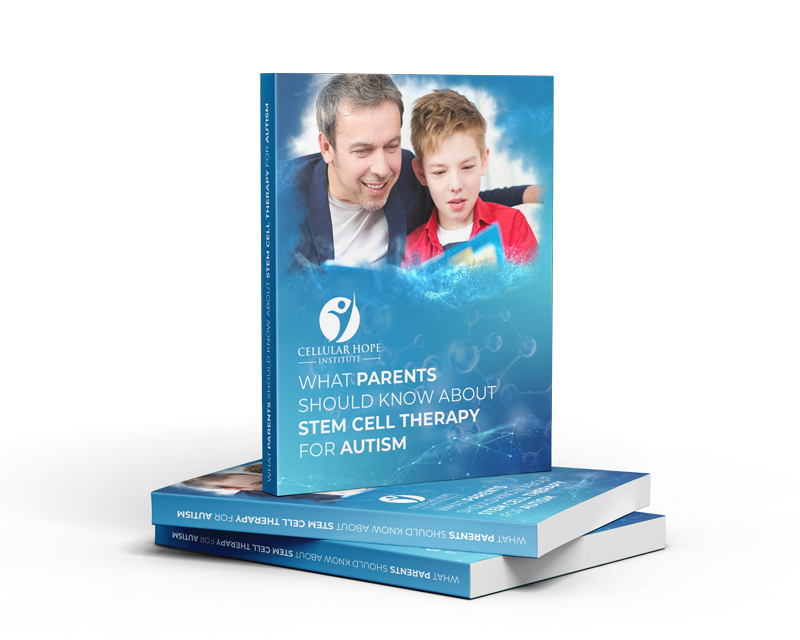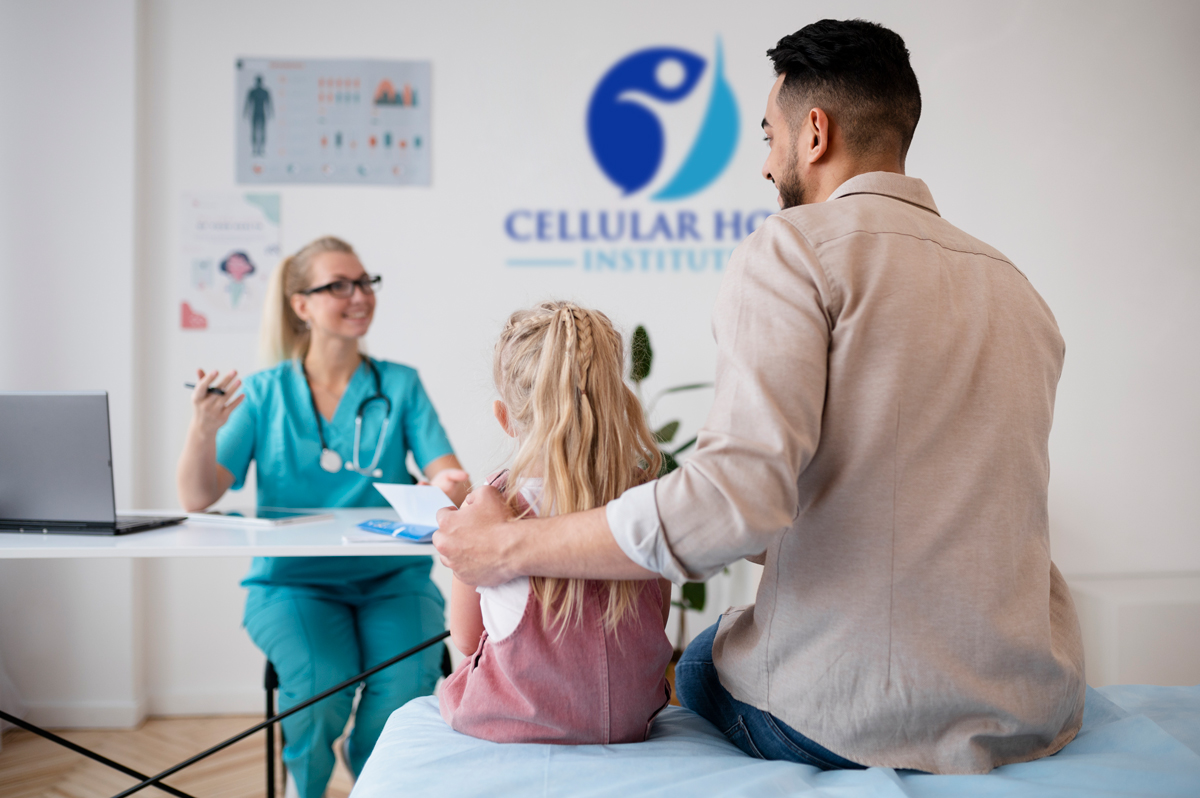Autism
Advancements made in regenerative medicine are swiftly approaching the development of an autism stem cell therapy. This is because stem cell therapy has already been established as an effective approach to many neurological conditions, as well as immunological, musculoskeletal, and physiological disorders and diseases.
Stem cells have a unique ability to influence metabolism and the immune system as well as to restore damaged cells and tissues. These therapies positively affect all body organs and systems, including the most important organ of all — the brain.
What Parents should Know about Stem Cell Therapy for Autism

This FREE guide reveals “What Parents should Know” when considering Stem Cell Treatment for Autism
Download Now
Stem Cell Autism Treatment in Mexico
Now stem cells are showing great promise for children and adults who need help in combating the symptoms of autism. While this therapy can be very beneficial, it is not a cure for autism in any way. The goal of stem cell autism treatment is to improve patients’ behavior and overall well-being.
Now stem cells are showing great promise for children and adults who need help in combating the symptoms of autism. While this therapy can be very beneficial, it is not a cure for autism in any way. The goal of stem cell therapy is to improve patients’ behavior and overall well-being.
The rationale behind treating autism with umbilical cord tissue-derived mesenchymal stem cells is that autism, and its degree of severity, has been significantly correlated inflammatory and neuro-inflammatory cytokines including macrophage-derived chemokine (MDC) and thymus and activation-regulated chemokine (TARC). Intravenous administration of umbilical cord MSCs has been shown in multiple clinical trials to decrease inflammation.
Decreasing inflammation in the autistic patient may alleviate symptoms of autism.
The treatment of immune deregulation using stem cells and exosomes for autism, has been shown to not only cause an improvement of intestinal and systemic symptomatology, but also to profoundly influence neurological function. Numerous reports exist of temporary neurological improvement by decreasing intestinal inflammation through either antibiotic administration or dietary changes.

Although some anti-inflammatory treatments have yielded beneficial effects, no clinical agent has been developed that can profoundly suppress inflammation at the level of the fundamental immune abnormality. At our autism therapy center we believe mesenchymal stem cell administration may be used for this purpose.
The medications used for treatment often lack evidence of safety and efficacy for the core features of Autism, and instead target maladaptive behaviours and comorbid psychopathology (i.e. irritability, depression, anxiety, hyperactivity and obsessive-compulsive behaviours).
Concerns over safety have limited the availability of approved psychotropic medications for children in general, and have been encouraging the development of biomedical treatments to target specific biological issues or symptoms. These include the use of: melatonin, acetylcholinesterase inhibitors,naltrexone, carnitine, tetrahydrobiopterin, vitamin C, glutamate antagonists, special dietary supplements, hyperbaric oxygen treatment, immunomodulation and anti-inflammatory treatments, oxytocin, acupuncture, music therapy and vision therapy.
In the midst of these various autism treatment options, stem cell therapies are emerging as the future of molecular and regenerative medicine and they are providing new opportunities for ASD interventions.
An important characteristic of mesenchymal stem cells is their ability to constitutively secrete immune inhibitory factors, this is believed to further allow inhibition of immunity in an antigen specific manner, as well as to allow the use of such cells in an allogeneic fashion without fear of immune-mediated rejection. Antigen immune suppression is believed to allow these cells to shut off autoimmune processes.
Get in touch with us to learn more about using exosomes for autism, as well as the different autism treatments we offer at our clinic in Mexico.
Experience our Individually-Center approach for deep regeneration and wellbeing through our leading-edge cellular therapies
Experience our Individually-Center approach for deep regeneration and wellbeing through our leading-edge cellular therapies
Things you Should know before Considering Stem Cell Therapy for Autism
Autism and autism spectrum disorders (ASDs) are heterogeneous, severe neurodevelopmental disorders with core symptoms of dysfunctions in social interactions and communication skills, restricted interests, repetitive – stereotypic verbal and non-verbal behaviours.
Biomolecular evidence points to complex gene-environmental interactions in ASDs. Several biochemical processes are associated with ASDs: oxidative stress (including endoplasmic reticulum stress), decreased methylation capacity, limited production of glutathione; mitochondrial dysfunction, intestinal dysbiosis, increased toxic metal burden and various immune abnormalities.
Equally, these immune dysregulations serve as the rationale for immune-directed interventions such as hematopoietic stem cells (HSCs), which are pivotal in controlling chronic inflammation and in the restoration of immunological balance. These properties make them potential agents for ASD treatments.
Our comprehensive stem cell treatment protocols for autism and other conditions employ well-targeted combinations of Exosomes, allogeneic human Mesenchymal cells, and autologous bone marrow and Adipose derived stem cells to treat the diseases and conditions listed previously. Our treatment plans are mostly focused on a systemic or whole-body approach to ensure these patients receive the highest quality and quantity of cellular products during their time in our hospital.
Of the different kinds of cellular products available for use, there are two main sources that can be used to target the conditions that have been previously discussed.
Autologous procedures are those in which the patient is their own donor for the cellular therapy treatment. In these kinds of procedures, a doctor takes a sample (usually of bone marrow or adipose tissue) and harvests the cells from it, before administering it locally to the diseased or damaged area.
Allogeneic procedures are those in which the patient receives cells that have been sourced from a donor that is not the patient. These samples are neonatal tissue and are comprised of umbilical cord blood. They are extensively screened to ensure the quality and health of the cells.
The type of treatment used depends on a variety of factors, including medical history and age. As an autism therapy center and a stem cell treatment clinic, we endeavor to give each patient a personalized, case-by-case treatment plan to ensure that the only possible outcome is a positive one.
If you are looking to leverage stem cells for autism and other conditions, you may want to know about the different administration methods that we use at our centers in Mexico.
After you’ve been selected a candidate, you will meet with our highly-trained team of medical professionals to devise a treatment plan tailored specifically to have the best results possible given your current condition. Below we will outline the different methods of administering cellular therapies that we use in our medical facilities:
intrathecal-intraarterial
This form of implantation is ideal for neurological conditions because the stem cells are injected past the blood-brain barrier and directly into the spinal fluid, which enables them to reach the spinal cord and brain.
During the procedure, an experienced anesthesiologist inject stem cells into the spinal canal through the lower vertebrae under local anesthesia. They are all performed in a positive airflow room under sterile conditions, and the procedure usually takes about thirty minutes.
Intravenous IV
The safest and simplest method for delivering the stem cells throughout the body. Anesthesia is not required. We may use Lidocaine topical spray to needle prick area beforehand. IV administration usually takes about 20 – 30 minutes.
A treatment of minimally manipulated, or autologous, stem cells is one in which the patient’s own cells are used to treat their illness without being grown in a laboratory setting. These treatments, while minimally invasive, can only reach a third of the total cell count that could be obtained under more complex laboratory processes, leaving them useful for certain conditions, but not potent enough for more advanced degenerative or neurodegenerative conditions.
Highly-manipulated cellular therapies for autism and other conditions are those that use a laboratory to culture and expand cells through the cell’s population. Through this process, samples of cells are grown to contain larger quantities of Mesenchymal Stem Cells, which leads to better patient results. In the case of complex conditions, including chronic degenerative conditions or neurodegenerative conditions, the best results are obtained through an infusion of a larger amount of cells directly to the diseased area. This is an invasive procedure, and because of that it requires a large, highly-specialized medical team to carry it out. That is the reason why many patients are opting to find the best results in the best facilities available, which are overseas, since current regulations prevent practices in the States from treating their patients in this manner. At Cellular Hope, we use stem cells and exosomes for autism in the most effective way possible.
The Cellular Hope Institute’s offices are located in the Amerimed Hospital in Cancun, which is accredited both by the Mexican General Health Council and the Canadian Accreditation Council. There, we have a highly-qualified team in many specialties, including pediatricians, radiologists, neurologists, anesthesiologists and regenerative medicine specialists, who convene with each other to produce the most reliable, efficable patient experience available.
Aside from its proximity to the United States and pleasant climate and sights, Our facilities in Cancun are top-notch, and include a laboratory to culture-expand cells, a process that yields better patient results, and a cryopreservation unit to keep these extracted samples stored safely until they are needed. Get the best autism treatment in Mexico.
Before the first day of autism treatment with stem cells, we go over the patient’s medical history, including previous and current treatments including physical therapy and cognitive therapy. We interview the patients to know more about them in order to form a custom treatment plan. On your first day in Cancun, we have scheduled a time for you to meet your medical team and ask them any questions you have, as well as for them to walk you through the treatment you will be undergoing.
|
|
First Consultation
The day before your procedure takes place, you will have a one-on-one with your specialized team, at which point your attending physician will go over your procedure and expectations. At this time, you may ask your doctor any additional questions you may have. This day will include:
- Analysis of current condition of the patient.
- New lab tests run.
- Specialist doctor evaluation according to the medical condition to be treated.
- Anesthesia evaluation.
- Establishment of final protocols to follow according to previous indicators.
Treatment Day
You will be picked up two hours before the procedure is scheduled to begin, please ensure that you do not eat eight hours before the procedure.
Once you arrive at the hospital you will be asked to sign all the necessary patient consent forms and you will be prepped for your procedure.
The procedure will take 3-4 hours, once the cells are harvested and prepared they will be administered to the patient in accordance with their . After the procedure is complete you will either be returned to your hotel or, depending on the procedure, your hospital suite for overnight observation.
A standard procedure for highly manipulated stem cells cell would be the following:
Extraction of bone marrow or fat sample. In the case of young children, who do not have very much adipose tissue, a bone marrow extraction through the iliac crest (hip bone) is usually performed.
Procedure is performed with local anesthesia and sedation, meaning there is little pain.After the sample is extracted, it is processed and isolated to obtain fresh mesenchymal cells. Approximately 80% of the mesenchymal cells obtained go directly to the patient, either through arterial catheterization in the case of neurological illness, or intrathecally to other damaged organs. The other 20% are sent to the lab to be expanded, a process which is known as the high manipulation of stem cells. The patient stays overnight for close clinical motoring.
Post-Operative Care
The day after the patient’s procedure, you will go to your follow up appointment, where your garment and bandages will be removed, your incisions will be cleaned and inspected, and you will get your first ultrasound scan.
Booster with highly manipulated stem cells:
(4th day stay). The physician or patient coordinator will notify you for the procedure with the stem cells that have been cultured and expanded in the laboratory. The patient receives a final booster through systematic approach via an intravenous line with the cultured cells.
After this, the physician team will make a final evaluation and, most likely, discharge the patient.
Departure day
A driver will pick you and the patient up at your accommodation, and you will be dropped off at the airport at least two hours prior to your flight’s departure. Your patient coordinator will let you know when the next virtual consultation will take place.
After the first session of using stem cells for autism, results can already begin to make themselves apparent, but this depends largely on the type of disease/condition the patient is afflicted with, as well as its severity and current phase of progression. Once the stem cell treatment begins, the body needs a minimum of four weeks to recognize the initial regenerative effects, which become more apparent at the six-month mark. Regenerative medicine is considered a multi-dose treatment, and reinforcements are usually required every six to twelve months. However, depending on a patient’s condition, they could be needed up to twenty-four months after the initial procedure. This is why cryogenically banking and storing stem cells is extremely important.
There is a virtual Assessment for Follow-Up treatment that serves as monitoring for the patient’s condition, and will be requested both before and after the treatment. In addition, there will continue to be post-treatment assessments required.
While stem cell therapy is an extremely safe alternative to many other invasive surgeries and therapies, it is not without its risks. However, these risks can be mitigated by selecting highly-trained, certified experts to perform your procedure. At The Cellular Hope Institute, we take every possible step and procedure to ensure a safe surgery conducted as quickly as can be safely done. During your consultation, you can bring forward any other questions or expectations with our expert physicians. Contact our autism therapy center to learn more about autism treatment options.
Years of Service
Assisted Patients
Years of Service
Assisted Patients
Contact Us to discuss your treatment at Cellular Hope Institute
Contact Us to discuss your treatment at Cellular Hope Institute
FAQ
Stem cell therapy for autism aims to address neurological and immunological issues associated with the condition. It potentially benefits individuals by promoting neural connectivity and reducing inflammation, which might improve behavioral symptoms and cognitive functions. However, the efficacy of this treatment varies and is still under study, as it is considered experimental.
Stem cell therapy for autism carries potential risks and side effects, including immune reactions, infection at injection sites, and the formation of tumors if cells proliferate uncontrollably. There’s also the risk of no improvement in symptoms.
The treatment’s experimental status necessitates close monitoring for adverse effects, emphasizing the importance of undergoing therapy at reputable medical facilities with experienced professionals.
The timeframe to observe improvements after stem cell therapy for autism can vary. Some patients might notice changes within a few months, while for others, it could take longer to see discernible benefits. The range of response times reflects the diverse nature of autism and individual differences in treatment efficacy. Continuous assessment is essential to gauge progress.
Stem cell therapy cannot cure autism, as autism is a complex neurological and developmental disorder with no known cure. However, stem cell therapy may offer improvements in certain symptoms associated with autism, such as social interaction and communication challenges, by potentially enhancing neural connectivity and reducing inflammation. The primary goal is symptom management rather than a cure.
